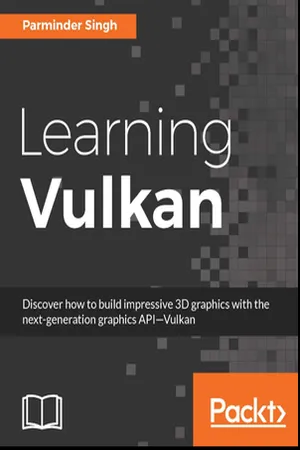
Learning Vulkan
Parminder Singh
- 466 pagine
- English
- ePUB (disponibile sull'app)
- Disponibile su iOS e Android
Learning Vulkan
Parminder Singh
Informazioni sul libro
Discover how to build impressive 3D graphics with the next-generation graphics API—Vulkan
About This Book
- Get started with the Vulkan API and its programming techniques using the easy-to-follow examples to create stunning 3D graphics
- Understand memory management in Vulkan and implement image and buffer resources
- Get hands-on with the drawing process and synchronization, and render a 3D graphics scene with the Vulkan graphics pipeline
Who This Book Is For
This book is ideal for graphic programmers who want to get up and running with Vulkan. It's also great for programmers who have experience with OpenGL and other graphic APIs who want to take advantage of next generation APIs. A good knowledge of C/C++ is expected.
What You Will Learn
- Learn fundamentals of Vulkan programing model to harness the power of modern GPU devices.
- Implement device, command buffer and queues to get connected with the physical hardware.
- Explore various validation layers and learn how to use it for debugging Vulkan application.
- Get a grip on memory management to control host and device memory operations.
- Understand and implement buffer and image resource types in Vulkan.
- Define drawing operations in the Render pass and implement graphics pipeline.
- Manage GLSL shader using SPIR-V and update the shader resources with descriptor sets and push constants.
- Learn the drawing process, manage resources with synchronization objects and render 3D scene output on screen with Swapchain.
- Bring realism to your rendered 3D scene with textures, and implement linear and optimal textures
In Detail
Vulkan, the next generation graphics and compute API, is the latest offering by Khronos. This API is the successor of OpenGL and unlike OpenGL, it offers great flexibility and high performance capabilities to control modern GPU devices. With this book, you'll get great insights into the workings of Vulkan and how you can make stunning graphics run with minimum hardware requirements.
We begin with a brief introduction to the Vulkan system and show you its distinct features with the successor to the OpenGL API. First, you will see how to establish a connection with hardware devices to query the available queues, memory types, and capabilities offered. Vulkan is verbose, so before diving deep into programing, you'll get to grips with debugging techniques so even first-timers can overcome error traps using Vulkan's layer and extension features.
You'll get a grip on command buffers and acquire the knowledge to record various operation commands into command buffer and submit it to a proper queue for GPU processing. We'll take a detailed look at memory management and demonstrate the use of buffer and image resources to create drawing textures and image views for the presentation engine and vertex buffers to store geometry information.
You'll get a brief overview of SPIR-V, the new way to manage shaders, and you'll define the drawing operations as a single unit of work in the Render pass with the help of attachments and subpasses. You'll also create frame buffers and build a solid graphics pipeline, as well as making use of the synchronizing mechanism to manage GPU and CPU hand-shaking.
By the end, you'll know everything you need to know to get your hands dirty with the coolest Graphics API on the block.
Style and approach
This book takes a practical approach to guide you through the Vulkan API, and you will get to build an application throughout the course of the book. Since you are expected to be familiar with C/C++, there is not much hand-holding throughout the course of the book.
Domande frequenti
Informazioni
Learning Vulkan
Learning Vulkan
Credits
| Author Parminder Singh | Copy Editor Gladson Monteiro |
| Reviewer Chris Forbes | Project Coordinator Ritika Manoj |
| Commissioning Editor Ashwin Nair | Proofreader Safis Editing |
| Acquisition Editors Smeet Thakkar Aaron Lazar | Indexer Rekha Nair |
| Content Development Editor Sachin Karnani | Production Coordinator Aparna Bhagat |
| Technical Editor Murtaza Tinwala | Graphics Abhinash Sahu |
About the Author
Acknowledgments
About the Reviewer
www.PacktPub.com

Why subscribe?
- Fully searchable across every book published by Packt
- Copy and paste, print, and bookmark content
- On demand and accessible via a web browser